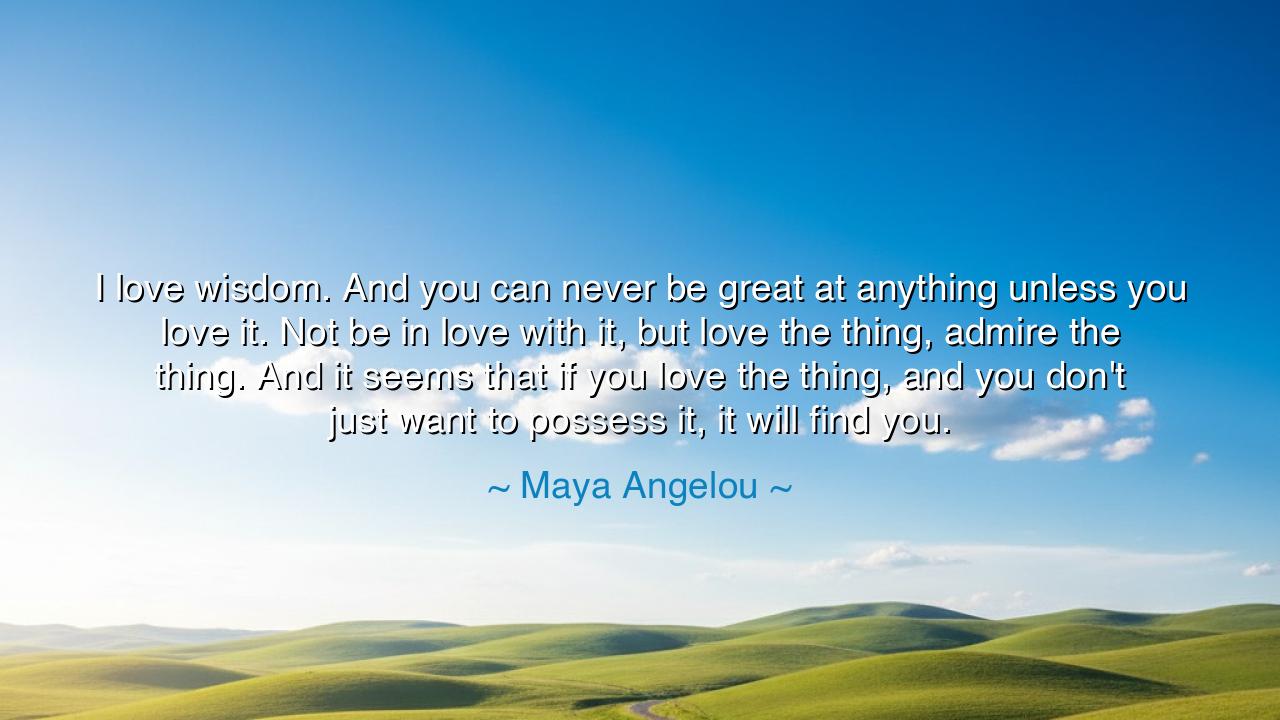
I love wisdom. And you can never be great at anything unless you
I love wisdom. And you can never be great at anything unless you love it. Not be in love with it, but love the thing, admire the thing. And it seems that if you love the thing, and you don't just want to possess it, it will find you.






Maya Angelou, voice of fire and grace, declares: “I love wisdom. And you can never be great at anything unless you love it. Not be in love with it, but love the thing, admire the thing. And it seems that if you love the thing, and you don’t just want to possess it, it will find you.” In these words she teaches the sacred secret of mastery—that greatness is born not of hunger for power or possession, but of reverence. To love wisdom is to stand before it with awe, not to clutch it as a treasure, but to let it shape you, guide you, and transform you.
The ancients knew this truth and called it philosophia, the love of wisdom. They did not claim to own wisdom, for such a claim would be arrogance. They called themselves lovers, seekers, admirers, kneeling before a mystery greater than themselves. Socrates, standing in the agora, claimed he knew nothing, yet his very love of truth drew others to him, and through that love, wisdom found him. Angelou’s words echo this humility: that the thing we seek most comes not through grasping, but through love and devotion.
History shows us this pattern in the life of Leonardo da Vinci. He was not content to possess knowledge as a trophy but loved the act of discovery itself. Whether sketching the flight of birds, studying the anatomy of man, or painting the eternal smile of the Mona Lisa, his greatness flowed from admiration—from his willingness to marvel endlessly. Knowledge sought as possession dies, but knowledge pursued in wonder endures.
Angelou also warns against false desire. To be merely “in love” with something is to seek it as one seeks a fleeting romance—selfishly, possessively, for what it can give. But to love the thing is different: it is to admire, to serve, to enter into communion with it. Then, as she says, the thing itself—whether wisdom, art, or truth—seems to find you. It enters the heart unbidden, because it recognizes in you a worthy vessel.
Let the generations remember: greatness is never won by those who chase glory as possession, but by those who love their calling with reverence. Love knowledge, and it will reveal itself. Love justice, and it will guide your steps. Love art, and it will breathe through your hands. As Angelou teaches, wisdom does not yield to the grasping hand, but descends to the heart that honors it. And when it finds such a heart, it makes that soul great.






DThuu duy tran
Reading this, I’m intrigued by the idea that love can attract wisdom and mastery. I wonder if this principle applies equally to abstract knowledge and practical skills, or if some disciplines demand more structured effort regardless of affection. Could the cultivation of admiration itself become a practice, fostering focus, insight, and creativity? The quote challenges me to think about the difference between possessing knowledge and being in a harmonious relationship with it, emphasizing respect and engagement over mere accumulation.
LGbao tran luong gia
I feel motivated by this quote, yet it raises questions about accessibility. How can people discover what to love deeply, especially when societal pressures or obligations obscure personal passion? Does the ‘thing’ finding you happen passively, or is it the result of persistent curiosity and openness? The quote makes me reflect on balancing discipline, patience, and love in the pursuit of wisdom and mastery, highlighting the importance of genuine connection over mere acquisition.
NNNguyen NGUYEN
This statement sparks curiosity about the relationship between love, focus, and achievement. Can someone truly excel at a craft or subject without a deep, respectful affection for it? I also wonder whether ‘love’ in this context is an emotional, intellectual, or spiritual engagement, and how it manifests differently in various fields. It encourages me to consider how nurturing admiration and commitment, rather than control or ego, shapes growth and attracts opportunities.
TThao
Reading this, I’m struck by the distinction Maya Angelou makes between love and obsession. I wonder how often people pursue mastery or knowledge with a desire to possess rather than appreciate. Does approaching something with admiration rather than ownership create a more sustainable path to excellence? The quote inspires reflection on how mindset, humility, and genuine passion influence success and fulfillment in both personal and professional pursuits.